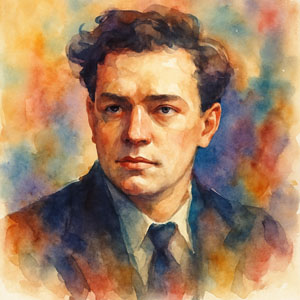~ Thomas Wolfe
 Writer Thomas Clayton Wolfe (1900–1938), born on this day in Asheville, North Carolina, is best known for his haunting fictionalized autobiography, Look Homeward, Angel (1929), which explored the “strange and bitter magic of life.”
Writer Thomas Clayton Wolfe (1900–1938), born on this day in Asheville, North Carolina, is best known for his haunting fictionalized autobiography, Look Homeward, Angel (1929), which explored the “strange and bitter magic of life.”
This powerful small-town recollection, written with uninhibited emotion, inspired such novelists as Norman Mailer and Jack Kerouac.
“I don't know yet what I am capable of doing,” Wolfe confessed to his mother, “but, by God, I have genius — I know it too well to blush behind it.”
His novels exposed hypocrisy and sparked controversy at home. “Most of the time we think we're sick, it's all in the mind,” observed the towering 6'3" Wolfe, who wrote with passion and rhetoric and believed deeply in America and in the heroism of its people.
“There are some people who have the quality of richness and joy in them and they communicate it to everything they touch,” he once wrote. “It is first of all a physical quality; then it is a quality of the spirit.”
With restless curiosity, Wolfe wandered through New York and Europe. His expansive writing celebrated vision and truth. With success as a novelist came his melancholy (and often-quoted) revelation that “you can't go home again.”
“I think the true discovery of America is before us,” he said. “I think the true fulfillment of our spirit, of our people, of our mighty and immortal land, is yet to come.”
Wolfe’s wide embrace of his heart...the homesickness and hope, the hunger for truth and belonging...reminds us that love is the thread that gathers us, and the path that leads us home.
 Belonging begins with love. 🌿❤️
Belonging begins with love. 🌿❤️
